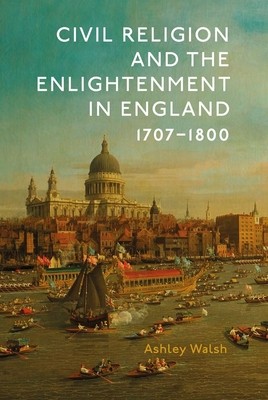
- We will send in 10–14 business days.
- Author: Ashley Walsh
- Publisher: Boydell Press
- ISBN-10: 1783274905
- ISBN-13: 9781783274901
- Format: 15.6 x 23.4 x 1.6 cm, kieti viršeliai
- Language: English
- SAVE -10% with code: EXTRA
Civil Religion and the Enlightenment in England, 1707-1800 (e-book) (used book) | bookbook.eu
Reviews
Description
This innovative book reveals how Enlightened writers in England, both lay and clerical, proclaimed public support for Christianity by transforming it into a civil religion, despite the famous claim of Jean-Jacques Rousseau that Christians professed an uncivil faith.
This innovative book reveals how Enlightened writers in England, both lay and clerical, proclaimed public support for Christianity by transforming it into a civil religion, despite the famous claim of Jean-Jacques Rousseau that Christians professed an uncivil faith. In the aftermath of the seventeenth-century European wars of religion, civil religionists such as David Hume, Edward Gibbon, the third earl of Shaftesbury, and William Warburton sought to reconcile Christian ecclesiology with the civil state and Christian practice with civilized society. They built their arguments in the context of England's long Reformation, syncretizing 'primitive' gospel Christianity with ancient paganism as they attempted to render Christianity a modern version of Roman republican civil religion. They believed that outward observance of the reformed Protestant faith was vital for belonging to the Christian commonwealth of Hanoverian England.Uncovering a major theme in eighteenth-century intellectual and religious history that connected classical Rome with Italian Renaissance humanism and the Enlightenment, this deeply interdisciplinary book draws from recent post-secular trends in social and political theory. Combining intellectual history with the political and ecclesiastical history of the Church of England, it will prove as indispensable for historians as studentsof political theory, theology, and literature.
EXTRA 10 % discount with code: EXTRA
The promotion ends in 21d.07:37:50
The discount code is valid when purchasing from 10 €. Discounts do not stack.
- Author: Ashley Walsh
- Publisher: Boydell Press
- ISBN-10: 1783274905
- ISBN-13: 9781783274901
- Format: 15.6 x 23.4 x 1.6 cm, kieti viršeliai
- Language: English English
This innovative book reveals how Enlightened writers in England, both lay and clerical, proclaimed public support for Christianity by transforming it into a civil religion, despite the famous claim of Jean-Jacques Rousseau that Christians professed an uncivil faith.
This innovative book reveals how Enlightened writers in England, both lay and clerical, proclaimed public support for Christianity by transforming it into a civil religion, despite the famous claim of Jean-Jacques Rousseau that Christians professed an uncivil faith. In the aftermath of the seventeenth-century European wars of religion, civil religionists such as David Hume, Edward Gibbon, the third earl of Shaftesbury, and William Warburton sought to reconcile Christian ecclesiology with the civil state and Christian practice with civilized society. They built their arguments in the context of England's long Reformation, syncretizing 'primitive' gospel Christianity with ancient paganism as they attempted to render Christianity a modern version of Roman republican civil religion. They believed that outward observance of the reformed Protestant faith was vital for belonging to the Christian commonwealth of Hanoverian England.Uncovering a major theme in eighteenth-century intellectual and religious history that connected classical Rome with Italian Renaissance humanism and the Enlightenment, this deeply interdisciplinary book draws from recent post-secular trends in social and political theory. Combining intellectual history with the political and ecclesiastical history of the Church of England, it will prove as indispensable for historians as studentsof political theory, theology, and literature.


Reviews